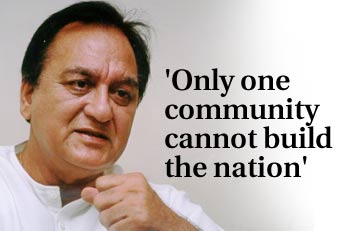Home > News > Interview
The Rediff Interview/Sunil Dutt, Congress MP
June 26, 2003

Despite poor health, actor-politician Sunil Dutt was busy meeting party workers last week, to coordinate his nation-wide anti-communalism campaign Sadbhavna ke Sipahi or soldiers of peace.
Dutt, the Congress MP from Mumbai Northwest, was seated on a sofa in an imposing bungalow at 9, Canning Lane, New Delhi.
Party workers, mainly youth, made a beeline to his meeting room to seek his "blessings."
Seated below portraits of Mahatma Gandhi and Congress President Sonia Gandhi, he spoke about the need to promote communal harmony and provide pure drinking water to the people.
Entrusted by Sonia to take charge of the anti-communalism campaign started after the sectarian strife in Gujarat last year, he has travelled extensively to spread harmony.
Before starting his eight-day campaign to Rajasthan from Rajghat, Mahatma Gandhi's memorial in Delhi, he spoke to Ehtashamuddin Khan about his mission for peace.
What is Sadbhavna ke Sipahi with which you are so involved?
This is a movement designed by our leader Sonia Gandhi after the Gujarat riots. Before that there was an earthquake in the state so the issue of rehabilitation was there. All these things were put together and she felt we should have more concern for the people.
The basic philosophy of sadbhavna is the feeling of harmony and friendship among people. This is the need of the day that people are forgetting. There is so much of unrest in different communities. So we want to bring everybody together. This is what Gandhiji did, Jawaharlal Nehru did and all our great leaders did.
To revive that she (Sonia) thought of starting a movement and she thought of me to be the chairperson. I also feel we need to bring people together on one platform. People should have love for the country and good understanding among themselves, whether Dalit or high caste Hindus or Muslims. The feeling of oneness should be there. Only one community cannot build the nation.
What have you done so far?
We took a jeep journey from Amritsar, prayed at the Golden Temple and then went to Jammu. We visited schools and colleges, social and religious organisations. We went to the temple which was attacked by militants [the Raghunath temple]. We went to Vaishno Devi, the Banihal Pass, Srinagar, Hazratbal and climbed up to the Shankracharya temple. That was before the elections in J&K.
Later we had a rally in Kanpur. It was a great success. We went to Madhya Pradesh twice. There was some problem in a gurdwara in Jalandhar. I went there. I met both communities to bring peace. It was also a success. I earlier went to Andaman and Nicobar islands.
What do you tell the people?
The issues that I raise are the need for schools, hospitals, eradication of poverty and providing jobs to the youth. If we fulfil these promises only then can we take pride in our country. All those who destroy peace, I feel they don't love the country.
Who are these people?
I don't know who these people are. Whoever they are, they are part of us.
Is there any political party or organisation involved in destroying peace in India?
Apart from political parties, any individual who destroys harmony should be educated. There is no question of political parties or organisations or even individuals. We are not facing them. We are not pinpointing people or organisations. They are part of our own system and society. We have to educate them and create such an atmosphere that we win our people.
When I walked from Bombay to Amritsar in 1987, it was at the height of militancy in Punjab. But when I went there, same people who were holding guns embraced me. They could have killed me. If I had approached them with a gun, it would be tit-for-tat. It is not that outside people are trying to destroy harmony here. They are our people.
The Ayodhya issue is again taking centrestage in Indian politics. Does that bother you?
I think it's media hype. The media should highlight people and organisations doing good work.
But all the political parties are raising this issue.
We have to see that the problem is solved amicably. We have to create an environment that people sit across the table like brothers and come to a mutual agreement. The solution can be only through negotiations. It will come through the movement of sadbhavna that we have started.
We will go and tell the people that for God's sake forget all differences. Pressure from the people will change the minds of politicians. In a democracy, it is the people that matter. We should educate people even in small places whom to chose and whom not to chose.
Where will the Ayodhya issue lead us to?